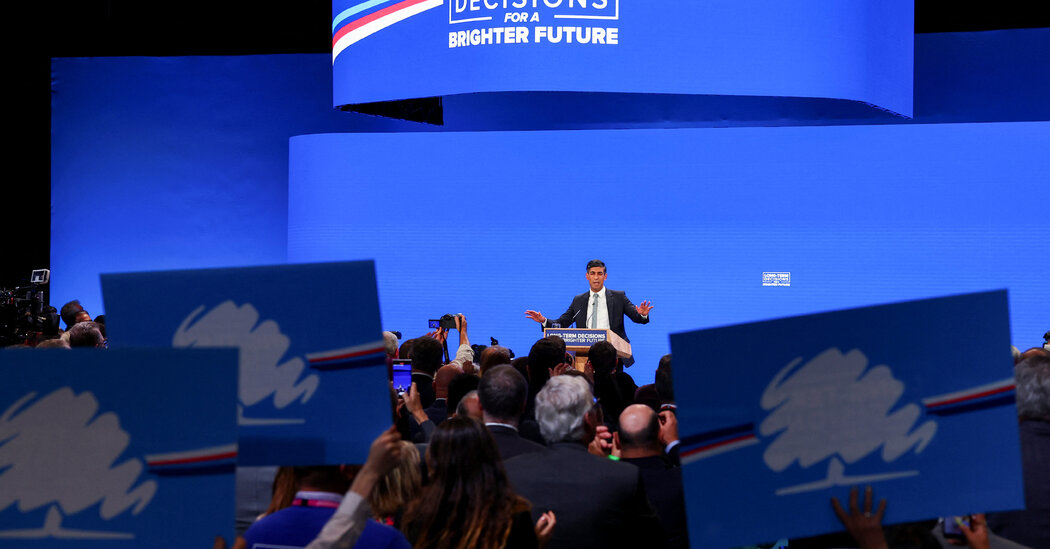As Prime Minister Rishi Sunak of Britain took to a stage in Manchester on Wednesday to give his first Conservative conference speech as party leader, he seemed determined to cast himself as a man of action who would rebuild his economically depleted country.
But undercutting his claim to be a builder, Mr. Sunak’s most important announcement was that he would pull the plug on a costly high-speed rail project that had, for years, been a cornerstone of his party’s promises to “level up” the north of England.
The prime minister said that the curtailment of the project, called HS2, was less a retreat than a redistribution of resources to better connect cities in England’s north with each other, rather than with London. He promised to build new light-rail networks, tram systems and upgrade motorways across the north.
“HS2 is the ultimate example of the old consensus,” Mr. Sunak said. “The facts have changed, and the right thing to do when the facts change is to have the courage to change direction.”
Yet the symbolism of shutting down a signature public-works project at a conference that used the slogan, “Long-term decisions for a brighter future,” was jarring.
The prime minister spoke in a vaulted convention center that was once a Victorian-era train station. Adding to the charged atmosphere in the hall, Manchester was to be a prime beneficiary of the rail line, which would have cut travel times to the capital by nearly half, to just over an hour. Now, it will terminate in Birmingham, in central England, forcing the new high-speed trains continuing on from there to travel more slowly along existing lines that are already congested.
Mr. Sunak said that the decision was proof of his capacity to make tough calls at a time of financial duress for Britain. His allies argue that the coronavirus pandemic changed travel patterns, making the project — with costs projected to soar to more than 100 billion pounds, about $121 billion — no longer necessary.
It was one of a series of moves, including watering down the country’s net-zero commitments and championing the rights of motorists, in which Mr. Sunak has tried to rebrand himself before a general election next year.
No longer the cautious technocrat who restored some of Britain’s financial credibility after the turbulent tenure of his predecessor, Liz Truss, Mr. Sunak now wants to be seen as a change agent with a populist touch as he attempts to persuade voters that he has something new to offer, despite his party’s holding power for nearly 14 years.
It is a tricky metamorphosis for the onetime investment banker, who came to power not through a national election, but after a vote by the tiny fraction of Britons who make up the Conservative Party rank-and-file.
The party sought to humanize Mr. Sunak on Wednesday with the surprise appearance onstage of his wife, Akshata Murty, who said that she and her husband were “best friends.” She recalled meeting Mr. Sunak as graduate students in California, described his upbringing in Southampton and celebrated his love for his country.
“He’s fun, he’s thoughtful, he’s compassionate, and he has an incredible zest for life,” Ms. Murty said, drawing some of the warmest applause of the conference.
Yet despite the unexpected personal touch, it was not clear how effective a reset Mr. Sunak would be able to make at the conference. When the attendees were not speculating about the status of the rail project, they were being distracted by rivals to Mr. Sunak, past and future.
Ms. Truss turned up to defend her trickle-down tax policies to an adoring audience on the fringes of the conference, while Suella Braverman, the home secretary, delivered a fiery speech on immigration that functioned as a kind of audition for party leader, should the Tories lose the general election, as polls suggest they will.
They brought a rare jolt of electricity to what was otherwise a rather flat gathering, reflective of a party that is trailing the opposition Labour Party by double digits and weary after a long stretch in government.
“There is no getting away from the fact that there aren’t many members of Parliament here,” said Anand Menon, a professor of European politics at King’s College London. “It’s a very sparsely attended conference, and there’s none of the buzz that we got used to have over the last five or six years.”
Ms. Truss’s appearance was a highly visible reminder of her short and disastrous period in Downing Street last year. But it also underscored the problem that Mr. Sunak faces in trying to reshape himself as the candidate of change.
He appears to have calculated that he needs to offer a new vision for Britain, in part to dispel the charge of the Labour leader, Keir Starmer, that the prime minister was “inaction man.” Yet both Ms. Truss and her predecessor, Boris Johnson, have a coterie of supporters within the party’s activist ranks and Mr. Sunak faces a delicate task in presenting himself as a fresh face without repudiating their records.
Even before Mr. Sunak spoke, Mr. Johnson urged him not to cancel the next phase of HS2, which many saw as a crucial element of his signature pledge to spread prosperity through the north and the Midlands, the policy known as leveling up.
With the polls uniformly predicting a Conservative defeat, Ms. Braverman was not the only minister apparently pitching herself as a possible successor to Mr. Sunak, should he lose. Kemi Badenoch, the trade secretary, also gave a speech aimed at the party’s right flank, even wading into the fraught issue of rights for trans people.
The jockeying for position was not quite as brazen as it has been in the past, Professor Menon said. Mr. Johnson, who used previous conferences to raise his profile and needle the leader, is no longer a member of Parliament and not in Manchester.
“It’s a lot more subtle than that,” he said, “though it’s not very subtle.”


